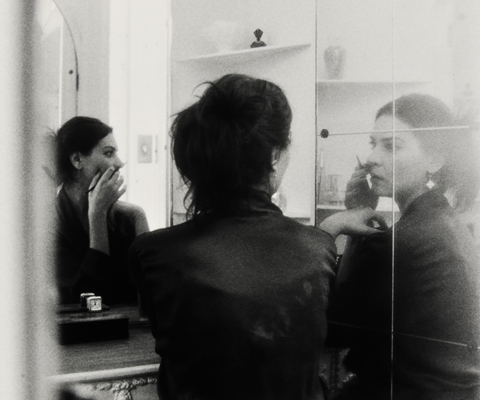
PHANTOM LOVE Is that your sister and your mother you see in the mirror, or just externalized parts of yourself? |
A woman croupier drifts like a ghost through languidly lit hotel spaces, or submits to jackhammer missionary intercourse while an I'm-not-here expression hardens her turned-away face. A punk Raskolnikov, a Jew in a poor Arab section of Tel Aviv, walks up and down narrow staircases, dodges harassers on the street, and holes up in nearly empty bars where electronic dance music supplies a background to his encounters with prostitutes and a sympathetic detective. These are the people and the spaces of Phantom Love (2007; February 25 @ 7 pm) and Dissolution (2010; February 26 @ 7 pm), two extraordinary feature films by US-Israeli filmmaker Nina Menkes that ArtsEmerson is bringing to the Paramount Center this weekend, with the filmmaker in attendance. The very emptiness of these spaces becomes a source of conflict and even heat, eliciting a response from Menkes's figures or responding in turn to some lack within them.Phantom Love is a pure psychodrama, in which the heroine's relationship with her sister and her mother (externalized parts of herself?) play out in elegant black-and-white images that carefully prowl their own borderline reality. Dissolution, a free adaptation of Dostoevsky's Crime and Punishment, departs from narrative to study a recalcitrant visual universe (also shot in black and white). In Dissolution's first shot, the landlady-avoiding, pawnbroker-killing hero (Didi Fine in a brilliant performance) contemplates a large snail; in a harrowing scene later on, he does battle with a chunk of cow lung, the only meat he can afford at the local butcher. These images of abjection are extreme signs of a meaninglessness and a powerlessness that the hero confronts throughout; meanwhile, Menkes counters this negative logic by showing women who stare back (at the hero, and above all at the camera). At the heart of the eat-or-be-eaten universe that the hero's nihilism implies, the dark stone of a ring found inside a grilled fish is a dark and bloody eye fixed on the camera — in accusation but perhaps also with love.
In both films, Menkes's camera plays the role of an uninvited guest — a role that involves her more and more deeply in the worlds she depicts. The films are not studies of (for example) alienation considered as a subject matter that the filmmaker views objectively and about which she has "something to say." Rather, they are shaped in terms of her analysis of her own disaffection from reality. The protagonists are not mere Others (the Raskolnikov figure, notably, is not merely a figure through which Menkes criticizes male violence) but individuals in whom the struggle and the flux of the films take vibrant (if also elusive) form.
With a few alterations that would surely have improved their commercial prospects, Phantom Love could have been a straight psychological drama about a woman living on the edge of a breakdown, and Dissolution a neo-noir set against the ethnic fragmentation of Israeli society. But narrative does not take the central place in Menkes's films. Neither does she rely on the rhetoric of expressiveness and gesture familiar from many experimental films. Instead, she works out an original style, drawing on both storytelling traditions and the traditions of personal filmmaking, but pitching her tent on neither side. Her unclassifiable cinema, whose fascination lies in the interplay among characters, space, and filmmaker, is truly all her own.
 Related
Related:
Play by play: April 17, 2009, Review: Waltz With Bashir, ArtsEmerson taps Hirsch as music booker, More 
- Play by play: April 17, 2009
Theater around town
- Review: Waltz With Bashir
The so-called anti-war-film genre has lately "distinguished" itself with a flurry of Iraq-war flops featuring earnest polemics.
- ArtsEmerson taps Hirsch as music booker
The theater district's ArtsEmerson project keeps getting more and more interesting.
- Review: Mad Horse's new-venue debut with Six Degrees
Last weekend was momentous one for Mad Horse: The theater company launched its 25th season, and welcomed audiences into its much-anticipated new performance space at Lucid Stage.
- ArtsEmerson's sophisticated street cred
Connoisseurs and casual consumers this season will enjoy two debuts that will instantly redefine the depth and breadth of the Boston arts experience.
- Review: A riveting Who's Afraid of Virginia Woolf?
Edward Albee’s brilliant, savage first full-length play, Who’s Afraid of Virginia Woolf? , needs to be done marvelously or not at all. So, thank goodness this Perishable Theatre production is a marvel indeed.
- Review: Doug Elkins's Fräulein Maria
Doug Elkins's Fräulein Maria at the Paramount
- Review: The Laramie Residency
You can't accuse "The Laramie Residency" of being anything less than exhaustive in its four-and-a-half-hour series of interviews about the 1998 Matthew Shepard murder.
- 11 must-see plays of early 2011
With such tantalizers in the wings, it’s hard to grieve over the exit of all the Rockettes, Scrooges, and tipsy Welshmen that see out the old year.
- Review: The Murder Trial of John Gordon at the Park Theatre
Who knew? Everybody knows about that frisky, independent start by Roger Williams, and the first bloodshed of the American Revolution with the burning of the Gaspee , but who knows about the dispute between the lowly immigrant Gordon family and the prestigious Spragues, which resulted in the last state execution in Rhode Island, back in 1845?
- Review: The Druid’s fine trip to Inishmaan
Although Martin McDonagh’s The Cripple of Inishmaan is the least likely of his plays to provoke a riot, as John Millington Synge’s The Playboy of the Western World did at its 1907 Dublin premiere, it is the most Synge-like of the Anglo-Irish dramatist’s works.
- Less

 Topics
Topics:
Features
, Tel Aviv, reality, Jew, More  , Tel Aviv, reality, Jew, prostitutes, drama, Adaptation, Ghost, Dostoevsky, ArtsEmerson, ArtsEmerson, Less
, Tel Aviv, reality, Jew, prostitutes, drama, Adaptation, Ghost, Dostoevsky, ArtsEmerson, ArtsEmerson, Less 